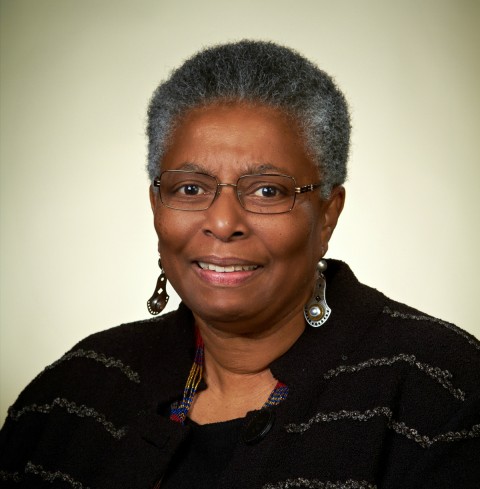Katie Geneva Cannon, groundbreaking womanist ethicist and theologian, dies at age 68
Teaching was her ministry.

Katie Geneva Cannon, one of the founders of womanist theology and ethics, died on August 8 at age 68. She had acute leukemia.
In 1974, she became the first African American woman ordained in a predecessor denomination of the Presbyterian Church (U.S.A.).
Cannon first took up womanism as a theological-ethical method in the 1980s, according to a volume on which she was an editor, Womanist Theological Ethics: A Reader. In an essay in the collection, she wrote, “Ethical discussions about race, sex, and class and their effects initiate processes that clear away distorted, warped, imposed confusion that hampers and oftentimes paralyzes justice-making moral agency.”
Emilie Townes, dean of Vanderbilt Divinity School and professor of womanist ethics and society, wrote of her colleague:
Katie Geneva Cannon was the consummate scholar and teacher. She wrote with passion and clarity, putting the religious worldviews of Black women front and center in moral discourse while calling both the academy and the church to task for their oppressive ways toward those who fall outside of constricting Eurocentric norms. Katie was a masterful teacher who spent hours thinking through her syllabi and her class sessions to create spaces for students to be able to step into their questions and reconsider their assumptions.
She mentored me and countless others as we have made our way into our ministries—academic, ecclesial, or secular. Her great gift in all that she did was that of having one of the best senses of humor I’ve ever encountered. She was an incredible storyteller who loved to leave one laughing…but also thinking. A great light has dimmed and it is for those of us who remain on this side of the Jordan to pick up our lanterns and trim them as we continue to do the work our souls must have.
Among Cannon’s other publications are Katie’s Canon: Womanism and the Soul of the Black Community (1996) and Black Womanist Ethics (1988).
Cannon was professor of Christian ethics at Union Presbyterian Seminary. Recently she founded the Center for Womanist Leadership there, not only for seminarians but also for college students, other graduate students, clergy, and theological faculty. She previously taught at Temple University, Episcopal Divinity School, and Harvard Divinity School, among other schools.
In an interview with Presbyterian News Service in March, she recalled growing up in Kannapolis, North Carolina, and going to kindergarten at a Lutheran Church: “In 1953, my intellectual curiosity was awakened in this formal world of religious learning.”
She learned lessons about God as love in school and in her home, where her parents were Presbyterian ruling elders.
“Yet from my earliest conscious moments, each night when I said my prayers, I talked to God about the pain of living in a racially segregated world,” she said. “I wanted this good, loving, and forgiving God help me understand the entrenched reasons why my signing up to participate in the Kannapolis city-wide spelling contest was a life-threatening transgression.”
Coming from that environment and being raised in the black church, she accepted the challenge to think theologically about the problems faced by black people in the church and society, she said.
She received many honors for those efforts, including the American Academy of Religion’s 2011 Excellence in Teaching Award. In June, the PCUSA General Assembly gave Cannon the Excellence in Theological Education Award.
“Teaching is my ministry,” she said in a video played at the award ceremony. “I love teaching to empower, to equip, to set people free.”
A version of this article, which was edited August 27, appears in the print edition under the title “People: Katie Geneva Cannon.”





